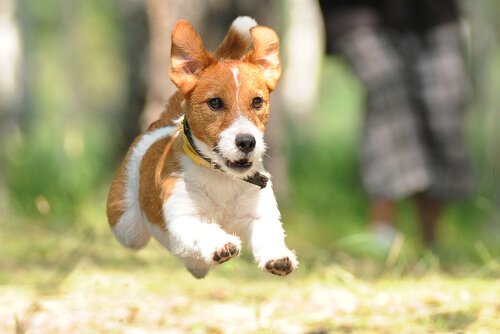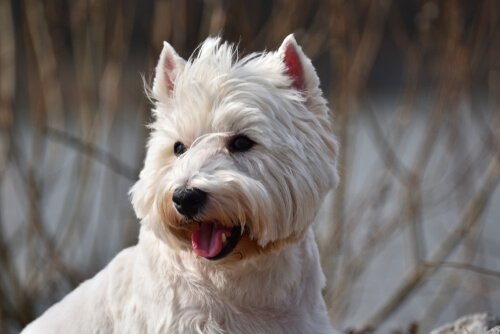Common Characteristics of Terriers

Terriers are brave, determined dogs that at one time were used to get small mammals out of burrows and hunt rats.
Terriers are usually small and courageous. Anyone who has met a Yorkshire Terrier knows this is true. In this article, we will dive into the general characteristics of Terriers. They have a lot more in common than their size.
A common history
Until just a few years ago, the creation of dog breeds depended on the jobs that they had to carry out: tracking down prey for hunting, protecting livestock, herding flocks of sheep… Therefore, genetic selection was based on personality and physical ability more than aesthetic beauty.
For example, the fastest dogs were selected and interbred. Their physique was developed and evolved for speed, and now we have the present-day greyhound. The same thing happened with all other breed groups: they had a job to do, and that’s why they are so similar among themselves.
As for Terriers, their name indicates where they come from: their job was closely related to the land (think of the word “territory). These dog breeds were trained to get small mammals out of their burrows, but also to hunt rats and other small prey.
Common characteristics of Terriers: physique
Due to this very specific job, common characteristics started to appear in Terriers that made them successful at their job. In general, they are small with well-proportioned or short legs.
Furthermore, they have rough, coarse hair, except for the lines bred specifically for beauty competitions. This type of fur protects them from dampness in the burrows; it also allows them to work in the rain or around areas with water their skin getting irritated. In addition, they don’t shed much, so they are recommended for people with allergies.

They have upright ears that have a rather high opening. They needed good hearing to tell if the burrows were occupied and to figure out where the prey was located. Their ears are quite flexible too, in order to identify where sounds are coming from.
Common characteristics of Terriers: personality
Their physique isn’t the only thing that makes them the best miniature hunters; personality has a lot to do with it too. There are also psychological characteristics that are common in Terriers. However, keep in mind that each dog’s experiences condition his behavior.
They bark a lot. Terriers are not usually good guard dogs because of their size, but they are very good at alerting their owners to the presence of intruders. In the past, they had to bark to tell the hunters where the burrows and prey were.
Many of these breeds had to face animals bigger than them, so they are also brave and bold. They don’t hesitate, even with dogs, animals, or humans that are larger than them. They are determined and energetic, and fast runners.

In addition, when Terriers are stressed, one of their primitive instincts comes out: they scratch the floor, make holes, and try to bury things. If you have a terrier that destroys potted plants or hides things in the yard, he may be telling you that he’s stressed!
List of Terrier dog breeds
There are many Terrier dog breeds, but these are the most common. Also, there are toy versions, which were never used for hunting. Instead, they were bred for beauty competitions, although they do still have the psychological characteristics.
- Yorkshire Terrier
- Jack Russell Terrier
- Spanish breeds: Gos Rater Valencià and Ratonero Bodeguero Andaluz
- Westie, or West Highland White Terrier
- Fox Terrier
- Irish Terrier
- Boston Terrier
Some attack dogs have Terrier genes even though their origin is not in hunting small mammals:
- Bull Terrier
- Staffordshire Bull Terrier
Like other groups of breeds, there are common characteristics in Terrier dogs that you can safely assume will be in any Terrier you adopt. They are nervous and bark a lot, but they are also courageous and determined. Because of their size and personality, they stopped working in hunting decades ago and now make wonderful pets.
Terriers are brave, determined dogs that at one time were used to get small mammals out of burrows and hunt rats.
Terriers are usually small and courageous. Anyone who has met a Yorkshire Terrier knows this is true. In this article, we will dive into the general characteristics of Terriers. They have a lot more in common than their size.
A common history
Until just a few years ago, the creation of dog breeds depended on the jobs that they had to carry out: tracking down prey for hunting, protecting livestock, herding flocks of sheep… Therefore, genetic selection was based on personality and physical ability more than aesthetic beauty.
For example, the fastest dogs were selected and interbred. Their physique was developed and evolved for speed, and now we have the present-day greyhound. The same thing happened with all other breed groups: they had a job to do, and that’s why they are so similar among themselves.
As for Terriers, their name indicates where they come from: their job was closely related to the land (think of the word “territory). These dog breeds were trained to get small mammals out of their burrows, but also to hunt rats and other small prey.
Common characteristics of Terriers: physique
Due to this very specific job, common characteristics started to appear in Terriers that made them successful at their job. In general, they are small with well-proportioned or short legs.
Furthermore, they have rough, coarse hair, except for the lines bred specifically for beauty competitions. This type of fur protects them from dampness in the burrows; it also allows them to work in the rain or around areas with water their skin getting irritated. In addition, they don’t shed much, so they are recommended for people with allergies.

They have upright ears that have a rather high opening. They needed good hearing to tell if the burrows were occupied and to figure out where the prey was located. Their ears are quite flexible too, in order to identify where sounds are coming from.
Common characteristics of Terriers: personality
Their physique isn’t the only thing that makes them the best miniature hunters; personality has a lot to do with it too. There are also psychological characteristics that are common in Terriers. However, keep in mind that each dog’s experiences condition his behavior.
They bark a lot. Terriers are not usually good guard dogs because of their size, but they are very good at alerting their owners to the presence of intruders. In the past, they had to bark to tell the hunters where the burrows and prey were.
Many of these breeds had to face animals bigger than them, so they are also brave and bold. They don’t hesitate, even with dogs, animals, or humans that are larger than them. They are determined and energetic, and fast runners.

In addition, when Terriers are stressed, one of their primitive instincts comes out: they scratch the floor, make holes, and try to bury things. If you have a terrier that destroys potted plants or hides things in the yard, he may be telling you that he’s stressed!
List of Terrier dog breeds
There are many Terrier dog breeds, but these are the most common. Also, there are toy versions, which were never used for hunting. Instead, they were bred for beauty competitions, although they do still have the psychological characteristics.
- Yorkshire Terrier
- Jack Russell Terrier
- Spanish breeds: Gos Rater Valencià and Ratonero Bodeguero Andaluz
- Westie, or West Highland White Terrier
- Fox Terrier
- Irish Terrier
- Boston Terrier
Some attack dogs have Terrier genes even though their origin is not in hunting small mammals:
- Bull Terrier
- Staffordshire Bull Terrier
Like other groups of breeds, there are common characteristics in Terrier dogs that you can safely assume will be in any Terrier you adopt. They are nervous and bark a lot, but they are also courageous and determined. Because of their size and personality, they stopped working in hunting decades ago and now make wonderful pets.
This text is provided for informational purposes only and does not replace consultation with a professional. If in doubt, consult your specialist.








